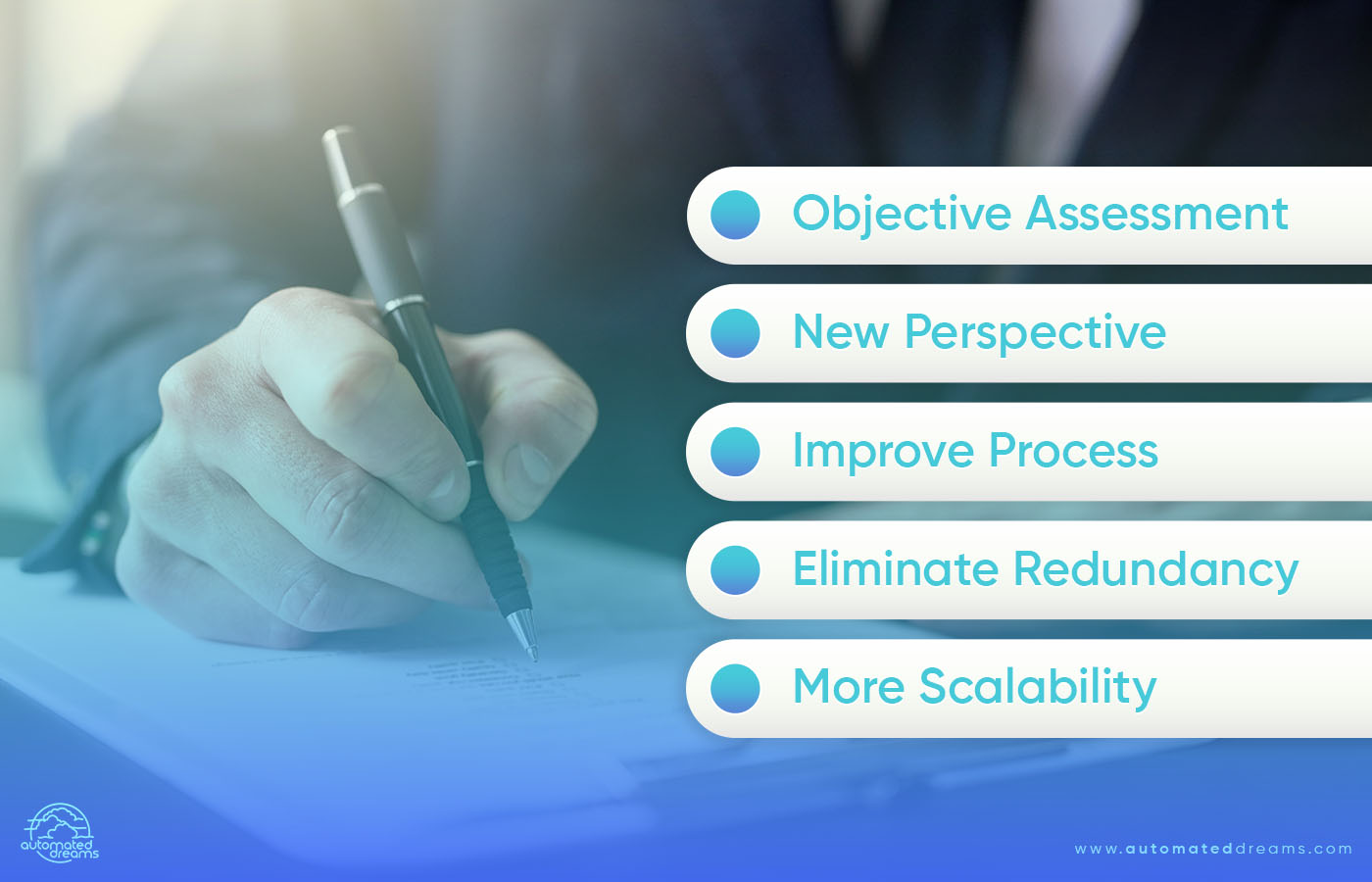Summary: Business operations are key to your success but can quickly become a tangled, outdated, inefficient web if not proactively managed. All heads of operations navigating business processes know that staying on top of best practices, new technologies, and competitors’ moves can be tricky and time-consuming. While it’s possible to manage it independently, working with a business process consultant helps you improve operational efficiency and achieve your goals faster.
Business process consultants offer fresh perspectives and frameworks that help you streamline processes, identify inefficiencies, and implement new solutions. By partnering with them, you can gain a deeper understanding of the impact of your current processes and identify areas for improvement.
Consultants help to create and implement a tailored process management strategy for your business and this usually leads to increased productivity, reduced costs, and improved customer satisfaction. A consultant can also help establish clear performance metrics, track progress, and continuously monitor and optimize processes. So if you’re looking to improve your processes, read on to learn.
Areas we’ll cover:
- What is Business Process Consulting?
- What Do Business Process Consultants Do?
- Which Areas Do Business Process Consultants Evaluate?
- What are the Core Business Process Consulting Steps?
- When Do You Need a Business Process Consultant?
- A Closer Look at How Does Business Process Consulting Work
- 5 Benefits of Working with Business Process Consultants
- 5 Cons of Working with Business Process Consultants
What is Business Process Consulting?

Business process consulting (BPC) is a service that helps businesses improve operations and achieve optimal efficiency. It optimizes business operations and enhances the way resources, employees, and technology are utilized in an organization. Since these are the moving parts of the business, business process consultants help determine how the day-to-day functions either contribute to or hinder the accomplishment of a business’ short- and long-term goals.
What Do Business Process Consultants Do?
Business process consultants equip businesses with data-driven, up-to-date process analyses that produce a fact-based perspective on eradicating weaknesses and optimizing results. In other words, business process consultants help you create and implement process management strategies customized to your specific needs.
A business process consultant helps you understand your current processes, identify areas for improvement, and implement new process and technology solutions. This often includes conducting research, analysis, and interviews to understand the inner workings of your business. Once this is done, consultants create and implement these strategies, which may include recommending BPM/BPA tools to drive better results.
Which Areas Do Business Process Consultants Evaluate?
The following are key areas business process consultants look at when evaluating business processes:
- Error triggers
- Time management
- Resources management
- Process bottlenecks
- Communication deficiencies
- Redundant processes that can be eliminated
- Activities that stretch the physical work process
What are the Basic Business Process Consulting Steps?

The basic steps business process consultants take when working with an organization include:
- Evaluating Your Current State: This usually involves observing the current business processes, interviewing staff and other key stakeholders, monitoring resource utilization, and gathering data to understand the current situation in your organization.
- Identifying Weak Spots: Here, business process consultants analyze the information or data gathered to identify possible weak spots. Then, they make recommendations on how to eliminate them.
- Implementation of Solutions: This is the final step, and involves devising and implementing strategies to achieve the projected results while monitoring performance and progress over a period of time.
When Do You Need a Business Process Consultant?

Every operations leader understands the importance of keeping processes running smoothly and efficiently and the gains from streamlining every process without compromising outputs. A business process consultant can help you achieve these results faster than in-house management teams. Why? They are skilled at unearthing potential pitfalls and implementing business automation strategies that reduce risk and ensure maximum efficiency.
Here are some of the primary signs your business needs the help of a business process consultant:
1. Inefficiencies in Operations
- Frequent Bottlenecks: Repeated delays or slowdowns in processes.
- Redundant Tasks: Multiple employees or departments performing the same tasks.
- Manual Workarounds: Employees often bypass systems or processes to get work done.
2. High Operating Costs
- Unexpected Expenses: Costs that consistently exceed the budget.
- Low Profit Margins: Operating costs are too high compared to revenue.
- Excessive Overtime: Employees regularly work overtime due to inefficient processes.
3. Poor Customer Satisfaction
- Frequent Complaints: Customers often complain about service delays or errors.
- Low Retention Rates: Difficulty retaining customers or clients.
- Negative Reviews: Persistent negative feedback online or through other channels.
4. Lack of Standardization
- Inconsistent Results: Output quality varies from one project or product to another.
- Difficulty Scaling: Challenges in replicating success when expanding or growing.
- Non-standard Procedures: Different teams use different processes to achieve the same goals.
5. Missed Deadlines
- Project Overruns: Consistent failure to meet project deadlines.
- Delayed Launches: New products or services are often delayed.
- Unmet Targets: Failure to meet sales, production, or other business goals.
6. Employee Frustration
- Low Morale: Employees are frequently frustrated with current processes or lack thereof.
- High Turnover: Difficulty retaining employees due to dissatisfaction.
- Lack of Engagement: Employees are disengaged or unmotivated.
7. Outdated Technology
- Obsolete Systems: Relying on outdated software or hardware that slows down operations.
- Incompatibility: New technologies are difficult to integrate with existing systems.
- Frequent System Failures: Regular breakdowns or failures of essential systems.
8. Regulatory Compliance Issues
- Frequent Audits: Regular audits reveal issues with compliance.
- Fines and Penalties: The business is subject to fines due to non-compliance.
- Difficulty Adapting: Struggling to comply with new regulations or industry standards.
9. Lack of Visibility
- Data Silos: Difficulty in accessing or analyzing data across departments.
- Poor Reporting: Inconsistent or inaccurate reports on business performance.
- Limited Insights: Decision-makers lack the necessary information to make informed decisions.
10. Strategic Drift
- Lack of Alignment: The company’s processes are not aligned with its strategic goals.
- Unclear Objectives: Employees are unsure of how their work contributes to overall business objectives.
- Missed Opportunities: Inability to capitalize on new opportunities due to rigid or outdated processes.
When these signs are present, a business process consultant can help analyze your current operations, identify inefficiencies, and recommend improvements to optimize these processes, reduce costs, and enhance overall performance.
A Closer Look at How Business Process Consulting Works

Business process consulting is an artful balance of strategy and organization – every step matters. The steps that govern an effective business process demand high-level organization and observation.
It starts with observing various stages within a process. Business process consultants roll up their sleeves and get immersed in learning. They observe the conduct and actions of individuals within a particular process in your business.
To understand the current processes and record observations, they inquire about the smallest details and connect all the dots.
Since process improvement is a lifelong goal for business process consultants, they believe there is always room to enhance a business process, no matter how great it currently appears to work. Process consulting combines problem-solving, technology, and management strategies to create optimal efficiency throughout your operations.
Below are key steps and strategies used in business process consulting:
- Mapping: Business process consultants gather information about your company’s operations and current processes by speaking with stakeholders like managers and conducting interviews with your employees. This helps them map an “as-is” state of your processes.
- Goal Setting: After gathering information about the business processes, a business process consultant will also work with managers and other stakeholders to establish the goals they want to achieve, whether it’s reducing costs, increasing productivity, improving communication, or streamlining processes.
- Critical Points Assessment: This involves assessing and determining the processes with the greatest weaknesses and evidence of inefficiency before proposing strategies or action plans to eliminate these inefficiencies.
- Modeling: Business process consultants start organizing, designing, or redesigning the process flows to eliminate barriers and make them more efficient.
- Implementing Updates: Once the process flow(s) have been redesigned, the next step is to implement the BPM/A tools and/or strategies recommended by the consultant.
- Standardization: This involves formalizing and educating employees on the new process flow. A strong change management strategy is needed for maximum stakeholder adoption.
- Deployment: This step includes defining the process flow, i.e., ordering the processes since they’re now streamlined and most of the repetitive tasks are now automated.
- Monitoring: This is the final stage where the business processes are monitored to ensure they meet important Objectives and Key Results (OKRs).
5 Benefits of Working with Business Process Consultants

There are several benefits businesses enjoy from working with business process consultants. Here are five:
1. An Objective View of Current Business Processes
Understanding the present state of your business processes is the first step in identifying the best course of action to improve them. If you are like most business owners, familiarity can cloud your assessment of the true state of things and you may be unable to recognize weak spots in your processes. Having a business process consultant assess your current processes provides a view without sentiments.
2. Bring A New Perspective to Your Business Processes
Streamlining a business process can be time-consuming. Managers and the RevOps team will not always have the right answers and skill sets. A business process consultant serves as a confidential sounding board for your employees. Many times employees will over- or under-estimate the time it takes to complete an item within a process when reporting it to their manager. A BPC knows this and can bring a fresh set of eyes, observe thoughtfully, and offer ideas that management may not typically notice or consider. They have certain strategies that have achieved results for other clients and replicate the processes for your business.
3. Improve Documentation and Better Decision-making Capability
Your workflows are only as effective as their documentation. With advanced cloud technology and data analysis at their fingertips, consultants can give your organization a complete picture of operations in real-time. A business process consultant is aware of the best documentation processes and methodology, making their inputs measurable and data-backed.
4. Eliminate Redundancy and Optimize Resources
One of the core objectives of business process management is to eliminate redundancy. Businesses often suffer from “detail overload,” getting stuck in tedious, endless loops of unneeded operations and procedures. Business process consultants understand what to and what not to include in your workflow and will assist you in eliminating redundant activities. With less redundancy, the company’s resources, including time, revenue, and personnel, can be better utilized for greater efficacy.
5. Help Businesses Become More Scalable
A common business buzzword you hear frequently but hardly see in action is scalability. When departments face periods of rapid expansion especially, it can be challenging to develop a plan to accommodate the growth. Business process consultants provide a practical roadmap to smoothly scale from point A to Z without leaving out any part of the business.
5 Cons of Working with Business Process Consultants

The decision to work with a process consultant depends on the specific needs and goals of a business. Working with process consultants can certainly be beneficial in some cases, but it’s important to understand their limitations. From costs to demanding timelines to difficulty adapting, weigh these potential pitfalls:
1. Cost
Hiring a good consultant can be a sizable investment and may not fit within your company’s budget. Develop a business case to outline the potential ROI and payback period.
2. Resistance to Change
All processes involve the human touch. Employees may resist the changes recommended by the consultant. Low adoption can lead to pushback, sabotage, slow implementation, or even failure to implement
3. Dependence on Consultants
Organizations can become overly dependent on a consultant and struggle to sustain improvements once the consultant is no longer involved. This is why choosing a consultant who transfers knowledge, delivers effective change management, provides robust documentation, and establishes a culture of continuous improvement is important.
4. Lack of Customization
A business process consultant may not fully understand your organization’s unique culture and processes, leading to recommendations that are not well-suited for the company. One size does not fit all. Your value proposition, human capital, technology, and culture are a unique combination. An expert should know this and customize a solution that produces your desired outcome.
5. Time Commitment
Working with a business process consultant can be time-consuming and may require your organization to dedicate significant resources to the project. Business process improvement is a collaboration. The more collaboration the better the outcome. However, collaboration requires time investment.
In a Nutshell …
The ultimate goal of business process consulting is to help organizations streamline operations, reduce costs, increase productivity, and improve customer satisfaction. A consultant helps to research and determine performance metrics, track progress, and continuously monitor and optimize your processes. In other words, business process consulting is important for organizations looking to enhance their operations and achieve all their business goals. Lastly, its benefits outweigh its underlying challenges.
If you’d like to assess your business process consultant needs, start by booking a free call with us today.


